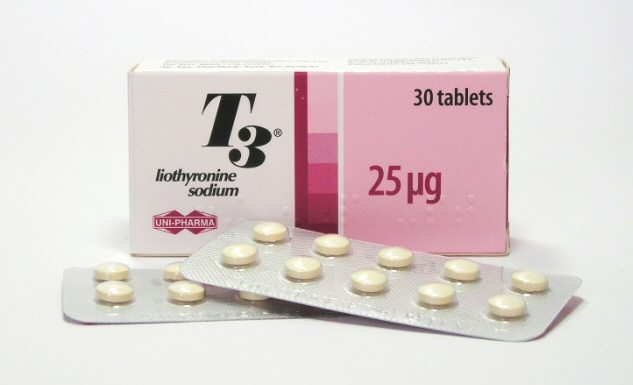How to use Cytomel T3
Medications like Thyroid, Cytomel, T3 and T4 are used to manage thyroid conditions, particularly an under-functioning thyroid. While they do cause weight loss, these drugs should not be used to help you lose weight if you have normal thyroid function. This is because your risk of developing adverse effects is greater than any weight loss benefits you may receive. Furthermore, there are a variety of prescription weight loss drugs available for your doctor to prescribe that are far more effective.
Cytomel
Cytomel, a brand name for liothyronine, is used to treat hypothyroidism, and sometimes to diagnose hyperthyroidism. Each pill contains either 5, 10 or 25 mcg or liothyronine. The typical starting dose is usually 25 mcg, with a gradual increase until you are taking 75 mcg to 125 mcg daily. Cytomel does not have any reported side effects aside from hyperthyoidism symptoms, which only occur if you are taking too much of it. It does, however, interact with a variety of drugs, including medications used for diabetes, blood-thinners and birth control pills. Rarely, it can cause allergic skin reactions. Because of this, you should not take Cytomel unless it is prescribed by your doctor.
Thyroid
Thyroid is a T3/T4 combination medication used to treat most kinds of hypothyroidism. It can also be used in the management of goiters and thyroid cancer. Each thyroid pill contains 38 mcg of levothyroxine and 9 mcg of liothyronine. This drug must always be taken under close supervision of a doctor, as your thyroid levels must be monitored regularly to ensure you are getting the amount you need. Side effects from using thyroid are rare when it is used correctly, though some people, especially children, may experience temporary hair loss.
Thyroid Medication and Weight Loss
Thyroid medication causes weight loss by speeding up your body’s metabolism. It will make your body burn more calories each day, even while you sleep. If you have an underactive thyroid, taking this kind of medication will result in rather rapid weight loss, especially if you are already dieting and exercising. If your thyroid is functioning normally, you will not lose weight taking normal doses of thyroid medication. The only way to lose weight would be to overdose on it. Such an overdose can cause severe and even life-threatening problems. Furthermore, thyroid medication causes you to lose muscle, especially if your thyroid is normal, according to a study published in the March 1997 issue of “the Journal of Clinical Endocrinology & Metabolism.” While the combination of fat loss and muscle loss will make it seem like you’re losing a large amount of weight at the beginning, your weight loss will slow and eventually stop. Muscle tissue burns a significant amount of calories, so its loss will slow down your metabolism, making it harder to maintain your weight loss or lose weight in the future. Furthermore, most people, especially athletes, find excessive muscle loss unappealing.
Adverse Effects
If you attempt to take thyroid medication for weight loss despite a normally functioning thyroid, you’ll end up with drug-induced hyperthyroidism. Weight loss is only one of the symptoms of hyperthyroidism. You may experience a variety of unpleasant symptoms, including muscle weakness, heart palpitations, diarrhea, insomnia, and heat intolerance, according to the National Institute of Diabetes and Digestive and Kidney Diseases. In rare cases, you may develop a condition called thyroid storm. Thyroid storm is characterized by fever, high blood pressure, tachycardia, nausea and vomiting. Congestive heart failure and seizures leading to death can occur.
Thyroid Supplement for Weight Loss
The thyroid gland helps regulate the body’s metabolism and as such can affect your weight. Although supplemental thyroid hormone may help with unwanted weight gain caused by thyroid dysfunction, synthetic thyroid hormone is a prescription medication that should only be taken by people with a documented thyroid problem. Certain vitamins and minerals may also help maintain thyroid health, but their benefits for weight loss are unproven. Talk to your doctor if you are concerned about thyroid disease and before taking any sort of supplement.
Thyroid Basics
The thyroid produces a hormone that regulates metabolism. Too little thyroid hormone production causes hypothyroidism. According to EndocrineWeb.com, as many as 10 million Americans may have some form of hypothyroidism. Hypothyroidism can cause mild weight gain or make it hard to lose weight. The condition can also cause chronic fatigue, dry skin, hair loss, cold intolerance, muscle cramps and constipation.
Synthetic Thyroid Hormone
People with hypothyroidism can take synthetic thyroid hormone to help supplement their thyroid hormone levels. Although correcting a thyroid hormone deficiency can help people with thyroid problems lose weight, supplemental thyroid hormone is not meant to be used as a weight-loss aid for people with normally functioning thyroids. Taking large doses of synthetic thyroid hormone can cause muscle and bone weakness or damage the heart.
Supplement Choices
Different vitamins and minerals are sometimes touted as important for maintaining thyroid health. One mineral in particular, iodine, is important for making thyroid hormone, and the lack of dietary iodine can contribute to lower hormone levels. Iodine deficiency, however, is very rare today in developed countries since iodine is added to table salt. Other supplements recommended for maintaining thyroid function include zinc, selenium and vitamins B, C, D and E. But there is no clinical evidence that these supplements have a significant effect on thyroid health or promote weight loss.
Diagnosing Thyroid Dysfunction
If you are concerned that your thyroid isn’t working properly, talk to your doctor. Feelings of fatigue and weight gain can be caused by many health problems, including depression. Your doctor can order blood tests that will measure thyroid hormone levels and determine if you have thyroid problem. Be sure to talk to your doctor first before taking any sort of supplement.


